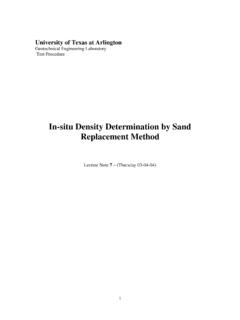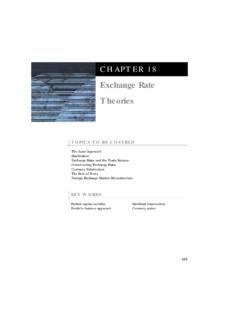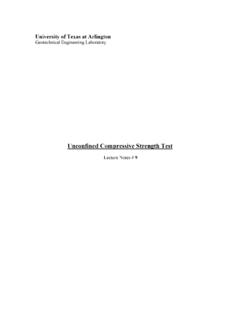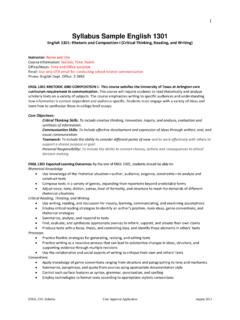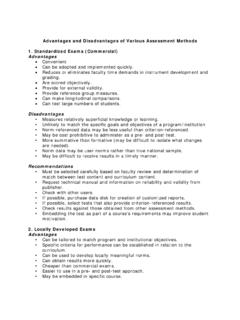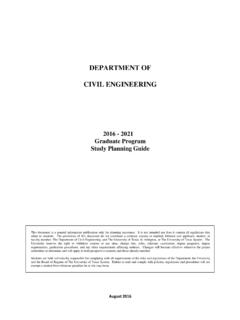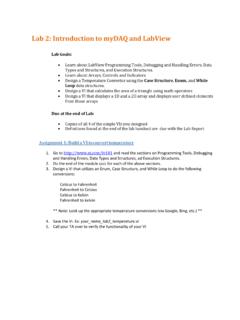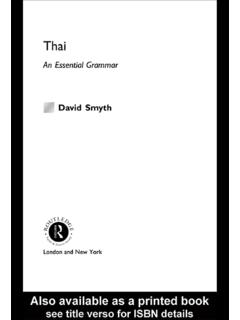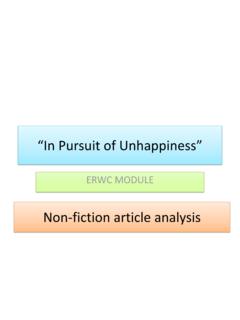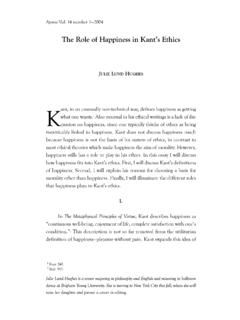Transcription of The Pursuit Of Happiness - uta.edu
1 The Pursuit Of Happiness -- Printout -- ,8816,2126639, [10/23/2012 7:44:32 AM]Back to ArticleClick to PrintMonday, Oct. 22, 2012 The Pursuit Of HappinessBy Jyoti Thottam / ThimphuThe whitewashed walls and gilded roofs of the Tashichho Dzong have withstood three centuries of fires,earthquakes and Himalayan winters. Inside this imposing fortress-monastery, in his elegant silk robe, PrimeMinister Jigmi Thinley presides over the government of Bhutan, an idyllic Buddhist kingdom known for itsgentle way of life. The fourth king coined the phrase gross national Happiness (GNH) more than 30 years ago tosuggest an enlightened Eastern alternative to the pressures of the materialistic West.
2 Dare to call Bhutan "thehappiest place on earth," however, and you are likely to provoke exasperated sighs from Thinley. He has madeit his mission since taking office in 2008 to prove to the world that GNH is more than just a utopian dream. Ithas sometimes been a struggle. "Translating GNH in terms of your plans, policies and programs, that waslacking," he says. "That, particularly for me, was quite frustrating."Bhutan has begun to use GNH as a broader and more nuanced measure of national progress than grossdomestic product. Outside the monastery walls, Bhutan faces many of the same challenges as the rest of theworld.
3 The rural poor struggle to earn enough from farming, so they migrate to overburdened urban areas;middle-class families worry about young people graduating from college without job prospects. The elite,meanwhile, fret that their kids are spending too much time on Facebook or with their is, in other words, experiencing the Easterlin Paradox, named for American economist RichardEasterlin, who first established that beyond a certain threshold, rising incomes don't bring Happiness . His mostrecent research finds the same paradox in China. In the , meanwhile, economic insecurity is affectingreported levels of Happiness .
4 The General Social Survey, the oldest effort to measure well-being in the ,found in 2010 "the lowest levels we've ever had," Easterlin says. "The picture is not encouraging."Bhutan's audacious solution is to build its society from the ground up using what it calls the "four pillars" ofGNH: sustainable economic development, conservation of the environment, preservation of culture and goodgovernance. It may be hard to draw conclusions from a tiny, aid-dependent country known as the Land of theThunder Dragon, but in some ways, Bhutan is a perfect economic laboratory. Because it is a new democracytiptoeing into the free market, its policymakers are free to try unorthodox ideas without being burdened by theThe Pursuit Of Happiness -- Printout -- ,8816,2126639, [10/23/2012 7:44:32 AM]legacy of how things were done before.
5 Bhutan's Happiness experiment has captured the fancy of economistsand politicians from Brazil to Britain, Tokyo to Taiwan, who are looking for a new path to free-marketprosperity--one that doesn't do so much damage to the environment, social equity and family life. "It's a verymeaningful philosophy, not just for Bhutan but for other countries as well," says Claire Van der Vaeren, head operations in Bhutan. "We think Bhutan is on to something very important."Measuring UpThe first step in making GNH useful is to measure it. Bhutan's 2010 GNH survey was nearly seven years in themaking, and its results were released earlier this year.
6 Researchers translated the core ideas into nine equallyweighted components of Happiness . To measure them, they designed hundreds of survey questions, eventuallyinterviewing 8,000 of Bhutan's 738,000 people in their homes to ask intensely personal, thought-provokingquestions: "How many people can you count on for help in case you get sick? How often do you talk aboutspirituality with your kids? When did you last spend time socializing with your neighbors? How comfortableare you with your level of household debt?" Taken together, the answers form Bhutan's first baseline on a scale that goes up to score represents the most comprehensive effort yet to devise an alternative to GDP, but it is certainly notthe only one.
7 Since the 2008 global financial crisis, the calls to rethink GDP have grown more vehement. "Thecrisis was very helpful because people realized the GDP wasn't telling us anything about what was going on,"says Joseph Stiglitz, a Nobel Prize--winning economist. "When Bhutan took up GNH, some people said it wasbecause they wanted to take attention away from lack of development. I think quite the contrary. The crisis hasmade us aware of how bad our metrics were even in economics, because GDP looked good, and then werealized it was all a phantasm."What's the alternative? Stiglitz has become the world's leading advocate for developing better measures ofnational well-being.
8 He leads an influential commission funded by the French government to come up withbetter ways of measuring it. In response, the Organisation for Economic Co-operation and Development puttogether the Your Better Life Index, a new Web tool that allows users to rank countries according to 11measures of well-being. The tool recognizes that everyone has a different idea of what Happiness looks like; youcan weight the index accordingly and work-life balance and the environment are most important, Denmark and Sweden rank highest. Give moreweight to income and health, and the and Switzerland top the chart. Stiglitz acknowledges that measuresof well-being won't displace GDP but believes they will certainly supplement it.
9 "I don't have any fear that itwon't take hold," he says. "The question is the pace with which they are implemented."The pace is picking up in Canada, where the province of Alberta and the city of Edmonton have supported thedevelopment of the Canadian Index of Wellbeing. It's similar to Bhutan's GNH Index, but instead of usingsurvey questions, Canadian researchers created a composite of 64 existing statistics, including work hours andThe Pursuit Of Happiness -- Printout -- ,8816,2126639, [10/23/2012 7:44:32 AM]incidence of violent crime, that are considered proxies for various components of well-being. "We didn't askCanadians how they feel," says Mark Anielski, who led the Britain's Office for National Statistics added four questions about well-being to its largest ongoinghousehold survey last year--including "How happy did you feel yesterday?
10 " and "How satisfied are you with lifenowadays?"--at a cost of $ million annually, about 1% of the agency's budget. The new questions werederided by critics as a frivolous expense in a time of austerity, but Prime Minister David Cameron, a longtimechampion of Happiness research, stood firm. "He took some political risks to support it," says Nic Marks,founder of the London-based New Economics Foundation's Centre for Well-Being. The new data will giveBritain's policymakers a more complete picture of how the country's citizens are faring, Marks says. "Mostpeople feel disconnected from the dominant economic indicators.
